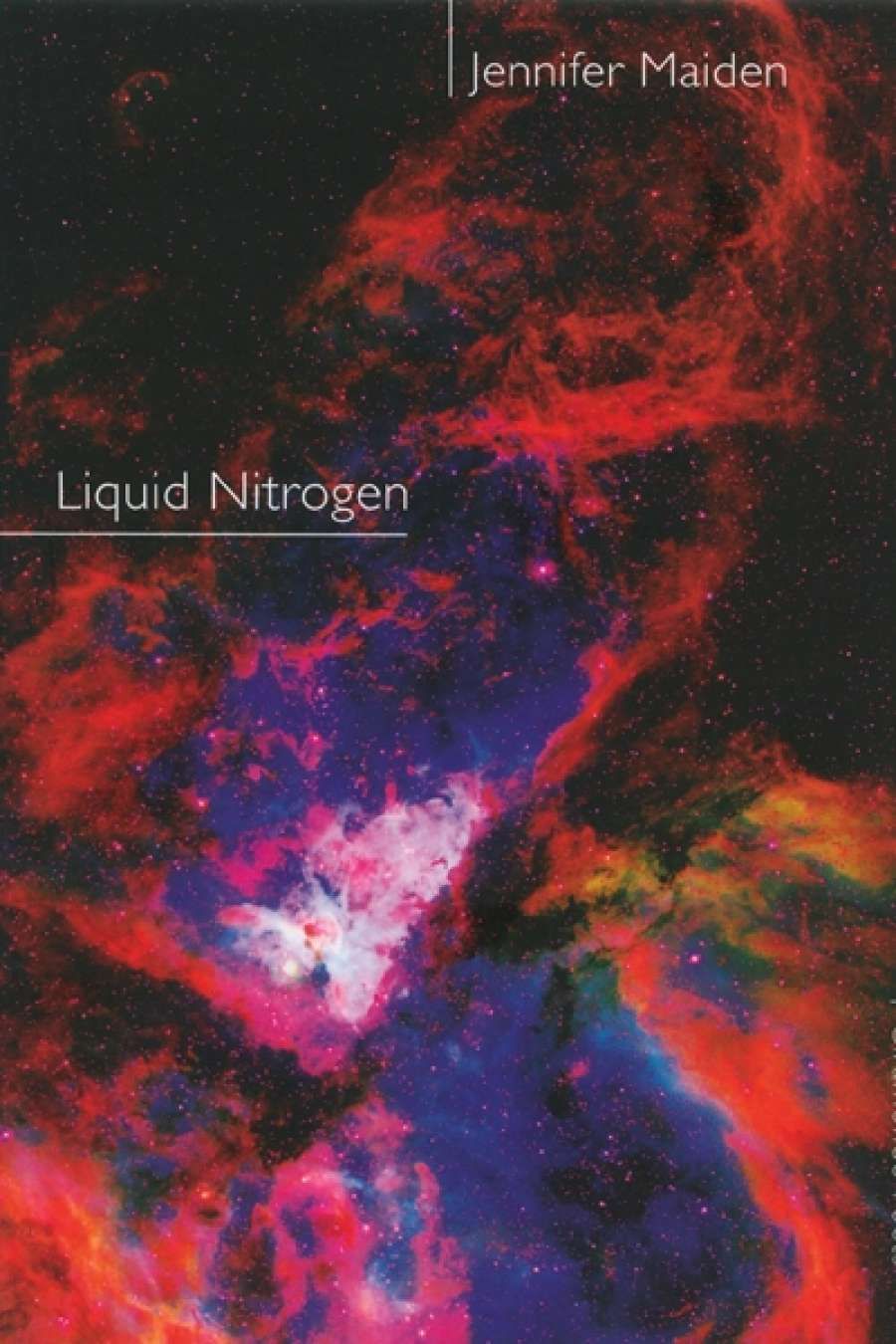
- Free Article: No
- Contents Category: Poetry
- Review Article: Yes
- Online Only: No
- Custom Highlight Text:
Jennifer Maiden has for a long time been one of Australia’s most politically engaged poets, a commentator on the local scene and the international set alike. With her new volume, Liquid Nitrogen, Maiden continues on from her previous books Friendly Fire (2005) and Pirate Rain (2010), with more poems centred on the journalist George Jeffreys, and further poetic conversations between Hillary Clinton and Eleanor Roosevelt, as well as new partnerships between Kevin Rudd and Dietrich Bonhoeffer, and Julia Gillard and Aneurin Bevan. These poems fold into a volume that also includes more of Maiden’s ‘diary poems’ and a number of smaller, non-sequential poems that nonetheless match the volume’s tone and may well contain the seeds of Maiden’s next book. The liquid nitrogen of the title appears first in George Jeffreys’s waking, and later in the poem ‘Diary Poem: Uses of Liquid Nitrogen’. Such echoes recur as Liquid Nitrogen conducts conversations not just within its probing poems, but also across the collection as a whole. The book is at once political and intimate, full of the real world and marked by the oneiric tone of conversations that cross the threshold of death.
- Book 1 Title: Liquid Nitrogen
- Book 1 Biblio: Giramondo, $24 pb, 86 pp, 9781920882990
Whilethe return of George Jeffreys in Pirate Rain was welcome – and while Hillary Clinton and Eleanor Roosevelt began their poetic conversations in that previous volume – in Liquid Nitrogen these reappearing characters feel fresh, their relationships to each other and the world deeper and more sure. In Pirate Rain, Hillary and Eleanor’s talk took on a domestic edge: bouquets of flowers and Eleanor’s pleasure in Hillary’s prettiness formed points of return. In Liquid Nitrogen these two former first ladies trade floristry for politics, as in ‘Hillary and Eleanor 9: The Pearl Roundabout’ when Maiden writes
Eleanor Roosevelt woke up in Paris. Hillary
Clinton wore an autumn jacket, bright
beads, and addressed the Press about
the new Libyan No Fly Zone.
Addressing her friend, Eleanor jumps into the fray with the words ‘But, now, about Bahrain, my dear …’ Maiden’s fascination with power drives poems throughout the collection, and this strange, imaginary relationship becomes more urgent when focused on matters of international consequence.
Maiden’s interest in power is matched by her interest in its supposed opposite, powerlessness. Julia Gillard, who first appears in the poems ‘Coal’, ‘A Great Education’, and ‘Poor Petal’, comes in for a drubbing in ‘Diary Poem: Uses of Powerlessness’ when Maiden opens with resignation
Okay, give me Gillard, Good
Spirit of the Universe, just as
you gave me George Bush Junior,
Condoleeza. And, okay,
you can throw in
Margaret Thatcher, now in favour
again because Meryl Streep’s
acting makes her look so powerless.
When she observes ‘mettle and powerlessness are not / different perhaps in kind’, Maiden describes a kind of stubborn fortitude she apparently does not admire.
Readers already familiar with her two previous volumes will be prepared to encounter the phrase ‘George Jeffreys woke up in …’; in Liquid Nitrogen this awakening spreads across the cast as her subjects awake in Australia, North America, Asia, and Europe; characters again watch television, and their wakefulness and watchfulness are the hallmarks of the volume. Ever sensitive to the shifting political landscape – Maiden sashays across the world stage, from the United States to China to Libya to Oslo in the wake of Anders Breivik’s massacre – these poems are, of course, timely; what will make them more enduring than their topicality is the way their braided narratives cycle through time, finding echoes of the present moment in history.
Eleanor
talked dust storms, despair, broken water, but
laughed again: ‘There’s more than one
Jerusalem’
The specific moment and specific players are made relevant through their connection to other moments of human terror, powerlessness, and despair.
Liquid Nitrogen opens on the brink with the poem ‘The Year of the Ox’ as Maiden writes
The Year of the Ox is almost over. I was born
in the Year of the Ox. The fireworks and Dogs
of Fear indistinguishable from Dragons dance
next for the Year of the Tiger. My daughter
was born in the Year of the Tiger.
Her gesture towards the ending of the year is constantly belied; in this poem and throughout the volume the ox reappears as a totem for the collection and for the poet herself. George Jeffreys pauses a moment to think, too, that ‘the Year of the Ox is almost over’. Maiden contemplates the characteristics of the beast: ‘alert to the point of twitching’ oxen ‘have electric rivulets for muscles … the veins too strong to show’ and ‘knees that snap like rifles’. Each time oxen reappear in this poem they are linked to the poet or her poetic project. In ‘Diary: Uses of Liquid Nitrogen’, the association between poet and ox re-emerges when Maiden’s speaker describes herself as ‘an ox not / seeing myself as a threat’ and, despite the imminent closure of the totemic animal’s year, this patient worker is not phased that the tiger is poised to take over because ‘The Year of the Ox is never over. What, tiger, / would you guard if the furrows filled / with mud not rice and water?’
As Maiden here reminds us, watchfulness is not enough. Though Auden tells us that poetry ‘makes nothing happen’, Maiden resists such a characterisation. Her political engagement results in poetry that feels necessary, as if it might just matter.


Comments powered by CComment